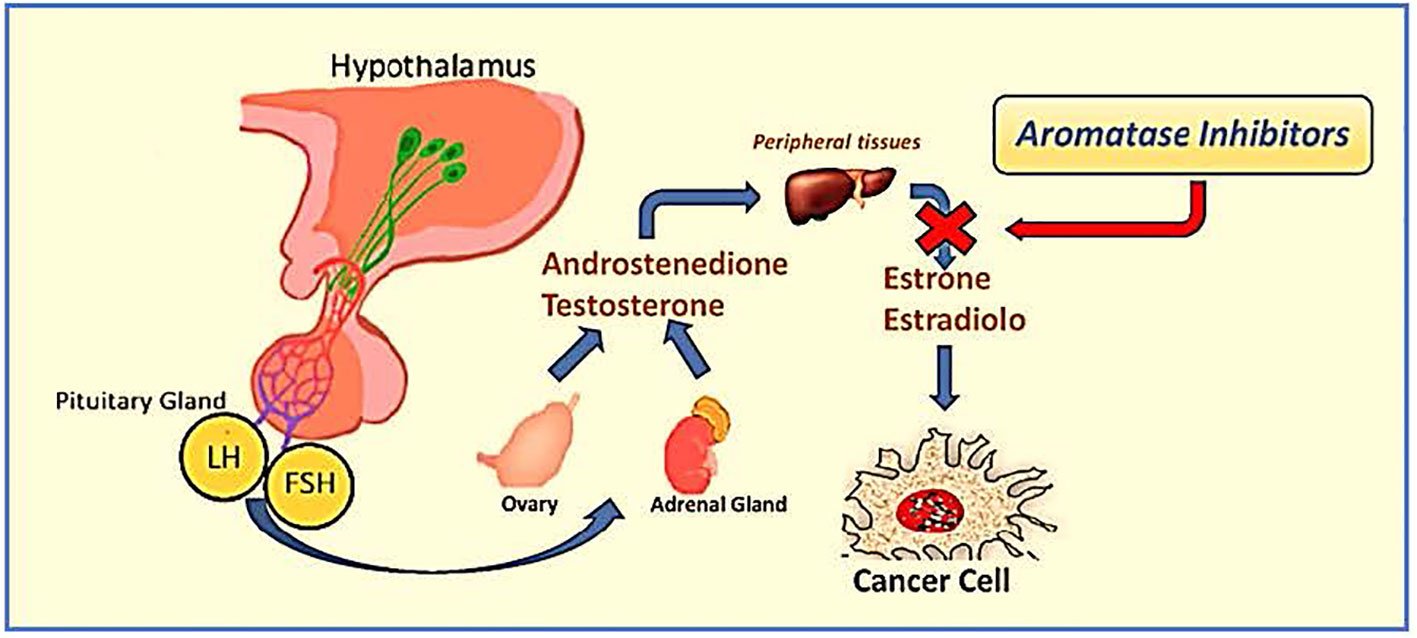
Introduction to Aromatase Inhibitors
What are Aromatase Inhibitors?
Aromatase inhibitors are medications used in the treatment of hormone receptor-positive breast cancer in postmenopausal women. These inhibitors work by blocking the enzyme aromatase, which is responsible for converting androgens into estrogen. By inhibiting this enzyme, aromatase inhibitors reduce the production of estrogen in the body. This decrease in estrogen levels helps slow down or stop the growth of hormone receptor-positive breast cancer.
Mechanism of Action
Aromatase inhibitors function by specifically targeting the aromatase enzyme. By inhibiting aromatase, these medications lower the levels of estrogen in the body, which in turn can help in the treatment of estrogen-dependent breast cancer. This targeted approach makes aromatase inhibitors a crucial part of hormone therapy for postmenopausal women with breast cancer. It is important to note that aromatase inhibitors are only effective in women whose ovaries are no longer producing estrogen and are often used after surgery or other treatments to reduce the risk of cancer recurrence.
Types of Aromatase Inhibitors
Nonsteroidal Aromatase Inhibitors
Nonsteroidal aromatase inhibitors, such as anastrozole, letrozole, and exemestane, are commonly used in the treatment of hormone receptor-positive breast cancer in postmenopausal women. These inhibitors work by binding to the aromatase enzyme and preventing it from converting androgens into estrogen. By reducing estrogen levels, nonsteroidal aromatase inhibitors help slow down the growth of hormone receptor-positive breast cancer.
Steroidal Aromatase Inhibitors
Steroidal aromatase inhibitors, like formestane, are another class of medications used to treat hormone receptor-positive breast cancer. These inhibitors also target the aromatase enzyme, but they do so through a different chemical structure. Steroidal aromatase inhibitors are less commonly used than nonsteroidal inhibitors but can be effective in certain cases where other treatments have not yielded the desired results. It is essential for healthcare providers to assess each patient’s condition and medical history carefully to determine the most appropriate type of aromatase inhibitor for their treatment plan.
Medical Uses of Aromatase Inhibitors
Aromatase inhibitors play a crucial role in the field of medicine, particularly in the treatment of various conditions. In breast cancer treatment, nonsteroidal aromatase inhibitors like anastrozole, letrozole, and exemestane are widely used for their ability to inhibit the aromatase enzyme, thereby reducing estrogen levels and slowing down the growth of hormone receptor-positive breast cancer in postmenopausal women. These medications have shown effectiveness in managing this type of cancer and are often included in treatment plans tailored to individual patients’ needs.
Breast Cancer Treatment
On the other hand, aromatase inhibitors also find application in ovulation induction. By regulating estrogen levels, these inhibitors can help stimulate ovulation in women who experience difficulties in conceiving due to hormonal imbalances. This use showcases the versatility of aromatase inhibitors beyond cancer treatment, emphasizing their significance in addressing reproductive health issues.
Ovulation Induction
Healthcare providers must carefully evaluate each patient’s medical history and condition to determine the appropriate type of aromatase inhibitor for optimal effectiveness. The continued research and development in this field contribute to expanding the therapeutic applications of these inhibitors in improving patient outcomes across various medical conditions.
Side Effects of Aromatase Inhibitors
Common Side Effects
Aromatase inhibitors, while beneficial for various medical conditions, can also have certain common side effects. Patients undergoing treatment with these inhibitors may experience symptoms such as hot flashes, joint and muscle pain, fatigue, and bone density loss. These side effects are often manageable with proper medical supervision and lifestyle adjustments. It is crucial for healthcare providers to monitor patients closely to address any discomfort or complications that may arise during the course of treatment.
Long-term Effects
In addition to common side effects, long-term usage of aromatase inhibitors may have specific effects that require attention. Prolonged use of these medications can impact bone health, leading to conditions like osteoporosis. Regular bone density monitoring and appropriate supplementation can help mitigate the risk of bone-related complications. Patients are advised to discuss any concerns regarding long-term effects with their healthcare providers to ensure a balanced approach to treatment that considers both the benefits and potential risks associated with aromatase inhibitors. It is essential to maintain open communication with healthcare professionals to address any issues promptly and optimize the overall treatment outcome.
Also Read: Effective Hormonal Therapy Options for Managing Hormone
Effectiveness of Aromatase Inhibitors
Clinical Studies
Studies have shown the efficacy of aromatase inhibitors in managing various medical conditions by reducing estrogen levels in the body. Clinical trials demonstrate that these inhibitors are effective in treating hormone receptor-positive breast cancer in postmenopausal women. The ability of aromatase inhibitors to block estrogen production has proven beneficial in preventing cancer recurrence and improving overall survival rates. Healthcare providers rely on the results of these studies to recommend the appropriate use of aromatase inhibitors based on individual patient needs.
Comparison with other Hormonal Therapies
When compared to other hormonal therapies, aromatase inhibitors have shown superior effectiveness in certain cases. Unlike selective estrogen receptor modulators (SERMs), which act by blocking estrogen receptors, aromatase inhibitors target estrogen production directly. This mechanism of action makes them particularly beneficial in postmenopausal women with hormone-sensitive breast cancer. While both treatment options have their benefits, healthcare professionals may consider the patient’s health status and medical history when determining the most suitable therapy. Discussing the advantages and potential side effects of aromatase inhibitors in comparison to other hormonal therapies can help patients make informed decisions about their treatment plan.
